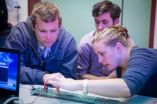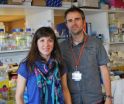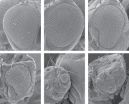(Press-News.org) The quest for the ultimate memory device for computing may have just taken an encouraging step forward. Researchers at The City College of New York led by chemist Stephen O'Brien have discovered new complex oxides that exhibit both magnetic and ferroelectric properties.
Combining both properties is very exciting scientifically for the coupling that can occur between them and for the devices that might ultimately be designed, in logic circuits or spintronics. Combining these two properties in a single material, however, has proved difficult until now.
Using an innovative inorganic synthesis technique, an interdisciplinary team led by Dr. O'Brien, associate professor of chemistry at The City College and a member of the CUNY Energy Institute at CCNY, prepared a mineral previously unknown in nature.
"It's based on common elements: barium, titanium and manganese," said Professor O'Brien, who's also an established nanotechnology researcher.
Together with collaborators from Drexel University, Columbia, Brookhaven National Laboratory and China's South University of Science and Technology, they solved the structure and observed both magnetic and ferroelectric behavior. What they uncovered was a new Hollandite crystal group designated "multiferroic."
Their finding confirmed a prediction by scientists dating back nearly two decades of the ferroelectric nature of such inorganic substances.
On multiferroics and their possible application, Professor O'Brien said: "The Holy Grail in this field is the combination of both magnetic and ferroelectric elements at room temperature with a sufficient magnitude of interaction."
This, he added, could lead to the "ultimate replacement for flash memory" or smaller memory devices with massive storage capacities.
This concurs with British physicist J.F. Scott, who is regarded as the "the father of integrated ferroelectrics." A researcher at Cambridge University, Dr. Scott believes that multiferroics might hold the future for the ultimate memory device.
INFORMATION:
The CCNY findings appear in the Nature online journal "Scientific Reports."
Oxides discovered by CCNY team could advance memory devices
2014-09-17
ELSE PRESS RELEASES FROM THIS DATE:
Engineers develop algorithms to switch out and recharge battery modules in electric cars
2014-09-17
Imagine being able to switch out the batteries in electric cars just like you switch out batteries in a photo camera or flashlight. A team of engineers at the University of California, San Diego, are trying to accomplish just that, in partnership with a local San Diego engineering company.
They have developed smaller units within the battery, called modules, and a battery management system that will allow them to swap out and recharge the modules, rather than swapping out the whole battery, which is cumbersome and requires large, heavy equipment. They recently presented ...
US health system not properly designed to meet needs of patients nearing end of life, says IOM
2014-09-17
WASHINGTON -- The U.S. health care system is not properly designed to meet the needs of patients nearing the end of life and those of their families, and major changes to the system are necessary, says a new report from the Institute of Medicine. The 21-member committee that wrote the report envisioned an approach to end-of-life care that integrates traditional medical care and social services and that is high-quality, affordable, and sustainable. The committee called for more "advance care planning" for end-of-life by individuals, for improved training and credentialing ...
First blood test to diagnose depression in adults
2014-09-17
CHICAGO --- The first blood test to diagnose major depression in adults has been developed by Northwestern Medicine® scientists, a breakthrough approach that provides the first objective, scientific diagnosis for depression. The test identifies depression by measuring the levels of nine RNA blood markers. RNA molecules are the messengers that interpret the DNA genetic code and carry out its instructions.
The blood test also predicts who will benefit from cognitive behavioral therapy based on the behavior of some of the markers. This will provide the opportunity for more ...
Many throat cancer patients can skip neck surgery
2014-09-17
A new study shows that patients with human papillomavirus (HPV) – the same virus associated with both cervical and head and neck cancer – positive oropharyngeal cancer see significantly higher rates of complete response on a post-radiation neck dissection than those with HPV-negative oropharyngeal cancer. Fox Chase Cancer Center researchers presented the findings at the American Society for Radiation Oncology's 56th Annual Meeting on Wednesday, September 17.
"For patients that achieve a complete response, neck surgery is probably unnecessary," says Thomas J. Galloway, ...
Five genes to predict colorectal cancer relapses
2014-09-17
Researchers at the Catalan Institute of Oncology-Bellvitge Biomedical Research Institute (ICO-IDIBELL), led by David Garcia-Molleví have identified 5 genes differentially expressed in normal accompanying cells in colorectal tumors. Analysis of these genes could be used to classify colorectal tumors, predict the evolution of the patient and thus take appropriate clinical decisions to prevent relapses.
Biomarkers
Colorectal cancer is the most common in our population considering both sexes. About 30,000 new cases are diagnosed each year. Of these, approximately 70% are ...
Abnormal properties of cancer protein revealed in fly eyes
2014-09-17
EAST LANSING, Mich. – Mutations in the human retinoblastoma protein gene are a leading cause of eye cancer. Now, Michigan State University scientists have turned to fruit fly eyes to unlock the secrets of this important cancer gene.
In a paper featured on the cover of the current issue of the Journal of Biological Chemistry, Michigan State University researchers provide the first detailed examination of a set of mutations similar to those present in the human cancer gene, said Irina Pushel, MSU undergraduate and co-author.
"By systematically evaluating mutations of ...
Moffitt researchers help lead efforts to find new genetic links to prostate cancer
2014-09-17
Researchers at Moffitt Cancer Center, including Center Director Thomas A. Sellers, Ph.D., M.P.H., Jong Park, Ph.D. and Hui-Yi Lin, Ph.D., have discovered 23 new regions of the genome that influence the risk for developing prostate cancer, according to a study published Sept. 14 in Nature Genetics.
Prostate cancer is the most common non-skin cancer in American men. About 1 in 6 men will be diagnosed with the disease in his lifetime. Family history is the strongest risk factor. A man with one close relative, a brother or father with prostate cancer is twice as likely to ...
Yoga may help people with bipolar disorder, reports Journal of Psychiatric Practice
2014-09-17
September 17, 2014 – People with bipolar disorder who do yoga believe their yoga practice has significant mental health benefits, reports a survey study in the September Journal of Psychiatric Practice. The journal is published by Lippincott Williams & Wilkins, a part of Wolters Kluwer Health.
"Some individuals with bipolar disorder believe that yoga has had a significant positive impact on their life." according to the study by Dr Lisa A. Uebelacker of Butler Hospital and Brown University, Providence, R.I., and colleagues. But they note their survey shows that yoga ...
Protein variant may boost cardiovascular risk by hindering blood vessel repair
2014-09-17
DALLAS – September 17, 2014 – Researchers at UT Southwestern Medical Center have found that the most common variant of the circulating protein apolipoprotein E, called apoE3, helps repair the lining of blood vessels. Individuals with another variant, called apoE4, do not get the benefit of this repair, putting them at higher risk for cardiovascular disease.
"We believe that we have identified one mechanism by which apoE3 promotes a healthy cardiovascular system and why a genetic variant, apoE4, is detrimental," said Dr. Philip Shaul, Professor of Pediatrics and Vice Chair ...
Researchers examine role of hormone in response to ovarian cancer treatment
2014-09-17
The work comes out of the molecular therapeutic laboratory directed by Richard G. Moore, MD, of Women & Infants' Program in Women's Oncology. Entitled "HE4 expression is associated with hormonal elements and mediated by importin-dependent nuclear translocation," the research was recently published in the international science journal Scientific Reports, a Nature publishing group.
The goal of the study was to investigate the role of the hormone HE4 in modulating an ovarian cancer's response to hormones and hormonal therapies. HE4 is a biomarker that is elevated in ovarian ...




